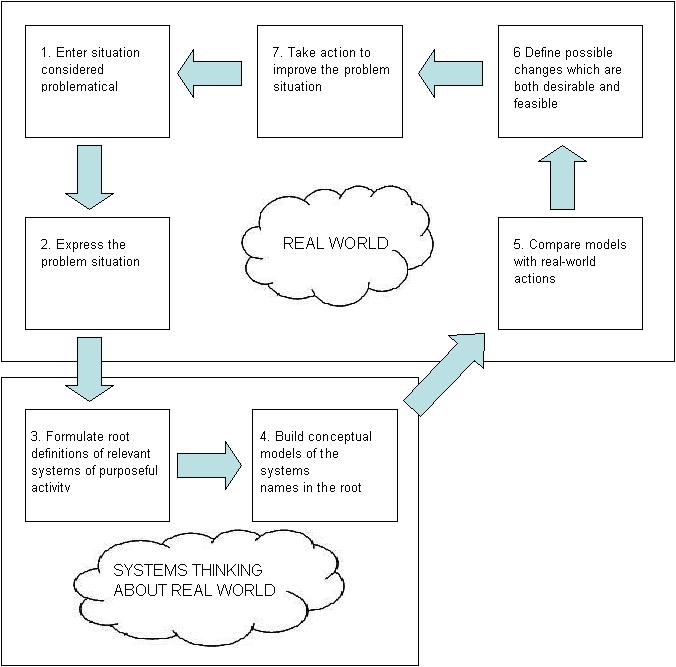Soft systems theory

Soft systems theory
Acronym
SSM
Alternate name(s)
Soft systems methodology
Main dependent construct(s)/factor(s)
Problem solution
Main independent construct(s)/factor(s)
Context specific
Concise description of theory
Problems can be categorized as either ‘hard’ or ‘soft’, each with unique characteristics requiring distinctly different approaches to resolve. Hard problems are well defined where the “What” and the “How” can be determined early in the research or system design methodology. A definite solution exists and specific objectives may be defined. Hard problems constitute the essence of the systems engineering approach. In contrast, soft problems contain social and political elements that confound problem definition and resolution (also referred to as ‘wicked’ problems). The question of “How to improve national health care in the U.S.” represents a soft problem.
To address soft problems, Peter Checkland developed an iterative approach known as the Soft Systems Methodology (SSM) that consists of seven distinct stages:
- Define and understand the problem situation (i.e. nature of the process, key stakeholders, etc.).
- Express the problem situation through Rich Pictures.
- Select how to view the situation from various perspectives and produce root definitions.
- Build conceptual models of the system requirements to adequately address each of the root definitions.
- Compare the conceptual models (step 4) to the real world expression (step 2).
- Identify feasible and desirable changes to improve the situation.
- Develop recommendations for taking action to improve the problem situation (implementing step 6).
The intention of SSM is to provide a framework for addressing ill-structured and poorly defined problem situations that contain significant social effects. The researcher/ developer must investigate solutions that possess aspects other than merely technical functionality.
Diagram/schematic of theory
Originating author(s)
Peter Checkland
Seminal articles
Checkland, P. Systems Thinking, Systems Practice, John Wiley & Sons, London, 1981.
Originating area
Computer Science
Level of analysis
Individual, group, network
IS articles that use the theory
Atkinson, C. J. "The Soft Information Systems and Technologies Methodology (SISTeM): an actor network contingency approach to integrated development", European Journal of Information Systems (9:2), June 2000, pp. 104-123.
Bausch, K.C. "Roots and branches: a brief, picaresque, personal history of systems theory", Systems Research and Behavioral Science (19:5), September/October 2002, pp. 417-428.
Doherty, N. F. and King, M. "The Importance of Organisational Issues in Systems Development", Information Techology and People (11:2), February 1998, pp. 104-123.
Jagodzinski, P., Reid, F. J. M., Culverhouse, P., Parsons, R. and Phillips, I. "A Study of Electronics Engineering Design Teams", Design Studies (21:4), July 2000, pp. 375-402.
Janson, M. and Cecez-Kecmanovic, D. "Making sense of e-commerce as social action", Information Technology & People (14:4), 2005, pp. 311-343.
Kiountouzis, E, Papatheodorou, C. "Distributed Artificial Intelligence and Soft Systems: A Comparison", The Journal of the Operational Research Society (41:5), May 1990, pp. 441-446.
Ledington, J. and Ledington, P. W. J. "Decision-Variable Partitioning: an alternative modelling approach in Soft Systems Methodology", European Journal of Information Systems (8:1), March 1999, pp. 55-64.
Ledington, P. W. J. and Ledington, J. "The problem of comparison in soft systems methodology", Systems Research and Behavioral Science (16:4), July/August 1999, p. 329-339.
Links from this theory to other theories
General systems theory, Work systems theory
External links
http://sern.ucalgary.ca/courses/seng/613/F97/grp4/ssmfinal.html#MAP, Report from Department of Computer Science, University of Calgary .
http://en.wikipedia.org/wiki/Soft_systems, Wikipedia entry.
Original Contributor(s)
J. Randel Kuhn, Jr.
Please feel free to make modifications to this site. In order to do so, you must register.
Return to Theories Used in IS Research
